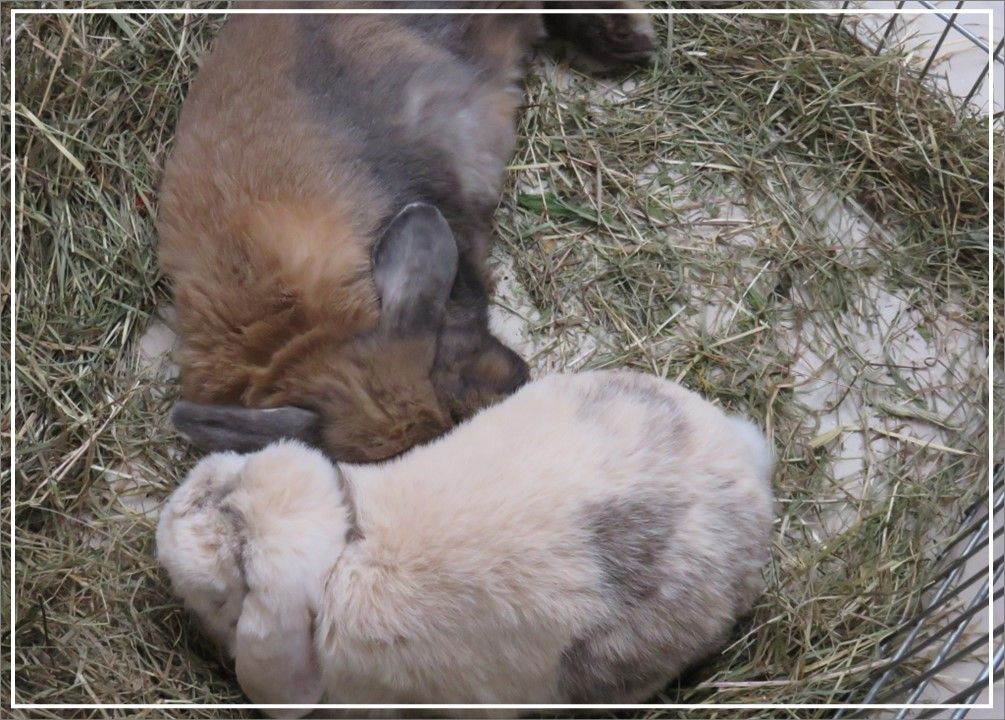bonding lessons #4 (aka a lesson on patience)

Other articles you might also enjoy:
are you feeling the overwhelm?
are you hurting yourself as a people pleaser?
... and many more
Do you know what the primary cause is for the breakdown and failure of the bonding process between two (or more) bunnies?
You might be surprised to learn that it usually has nothing to do with the bunnies and everything to do with the humans involved, usually the guardians. Because humans aren’t the most patient species on the earth. And they also come with a rather large ego. Both of which, combined, can lead to disaster when you’re bonding bunnies.
You see, when guardians are bonding their bunnies, they often forget that the bonding is between the bunnies and should be at their own pace, however long that may take. And so, impatience kicks in, and guardians want their bunnies bonded as quickly as possible. And the ego kicks in too, and the guardians think they know what’s best for the bunnies. Inevitably, when these two things get involved in the process, the process breaks down and both bunnies and guardians find themselves right back at square one.
Why?
Well, you see bunny bonding is not normally a fast process because bunnies are incredibly territorial animals. It takes them time to get comfortable with each other, to build up a trust in each other, to know that they will protect each other should any danger arise, such as predators.
Think about it yourself, from your point of view. How quickly does it take you to truly and deeply connect with someone, to decide that you want to spend everyday of your life with them? That’s not something that happens overnight so why should we expect it to happen overnight for bunnies?
The whole process from beginning to end doesn’t take days or weeks, it tends to take months. That’s months of daily sessions of 4+ hours. Because if you miss a day you could easily land back at square one and all the hard work you (or more precisely, your bunnies) have done will be wiped out. And if the sessions aren’t long enough, the bunnies aren’t able to behave naturally.
With so much time invested every single day into the bunny process, with only slow gradual steps being taken at a pace that suits the bunnies, can you appreciate why many guardians’ patience begins to wane?
And can you, perhaps, understand why so many guardians struggle with bonding, because it is such a slow process?
However, it’s not just the guardians who have to exercise patience during the bonding process, the bunnies also have to exercise patience with each other too, especially in the early stages when they’re just getting to know each other, getting a feel for what makes the other tick.
Patience is a trait and skill I have watched both our bunnies develop.
At first it was Bobo who had to dig deep and be patient as Olaf, at the start, was really sacred and, so, was quick to protect himself by attacking.
What Bobo did in those early sessions wasn’t just an act of patience, but also an act of calmness, maturity, and bravery. He understood that, being half his size, Olaf was afraid. And when Olaf was afraid, he would go into attack mode.
Whilst I was always on hand to bring any attacks to an instant end, Bobo learned that if he didn’t react back and attack Olaf in return, but rather let his body fall flat on the ground, thus looking smaller, Olaf would calm down faster.
It wasn’t a tactic that had immediate perfect results, but with patience and persistence, repeating the same action over and over again, Olaf gradually began to relax and not see Bobo as a threat.
When it was Olaf’s turn to practice patience with Bobo, he used a different tact.
Towards the end of session 24/day 24, Bobo started to assert a new type of dominant behaviour, something that is necessary to determine bunny hierarchy. There are two ways that a bunny claims to be the dominant bunny. One is through placing their head flat on the ground, demanding licks from the other bunny. The other way is through humping (or mounting) which looks like they’re mating, but it’s purely a dominant behaviour in the bonding process.
It was this latter behaviour that Bobo started in session 24. The demands for licks had begun much earlier and Olaf was more than happy to submit and lick.
When Bobo first started humping, it was fast, it was excessive and it was frenzied. Whilst humping is not usually considered a negative behaviour during bonding because it enables bunnies to determine their hierarchy, when it is excessive and frenzied, it becomes a negative behaviour.
This is where Olaf took on the calm, brave and patient role that Bobo had adopted earlier. Every time Bobo hopped towards Olaf to hump, Olaf, who wasn’t immediately open to this behaviour, immediately spun round to face Bobo and stopped him by quickly licking his head.
Where many another bunny may have spun round to bite or attack Bobo, Olaf spun round to lick him. And he kept doing this often until eventually, although it does still happen, the humping became a natural behaviour that happens every now and then during a session rather than incessantly.
You’ve probably heard the saying, “patience is a virtue”, a behaviour that is defined as demonstrating high moral standards. It’s the ability to stay calm while waiting for an outcome that you need or want - not an easy skill to master, especially in today’s modern, fast-moving world filled with the need for instant gratification.
And whilst all of us, succumb to impatience every once in a while, doing so often can create negative results. For example, it can hurt your relationships, it can increase stress levels, it can escalate an already tense and difficult situation, and it can even harm your reputation.
Patience is important because it helps you see things to their end, without giving up. Such as with bunny bonding. It’s a slow and very gradual process. If you don’t exercise good patience, you’ll easily and quickly give up, and the bunnies won’t have the opportunity to enjoy the bliss of sharing their life with a fellow bunny companion.
It’s patience that enables you to stay effective for the long haul, no matter what the situation or circumstance may be.
With patience being such a valuable trait, and one that seems more challenging to acquire in our modern world, how can you improve your patience? Well, this is exactly the advice and guidance I asked from the angels through my oracle cards.
Would you like to hear the advice and guidance they shared?
Viv xx
